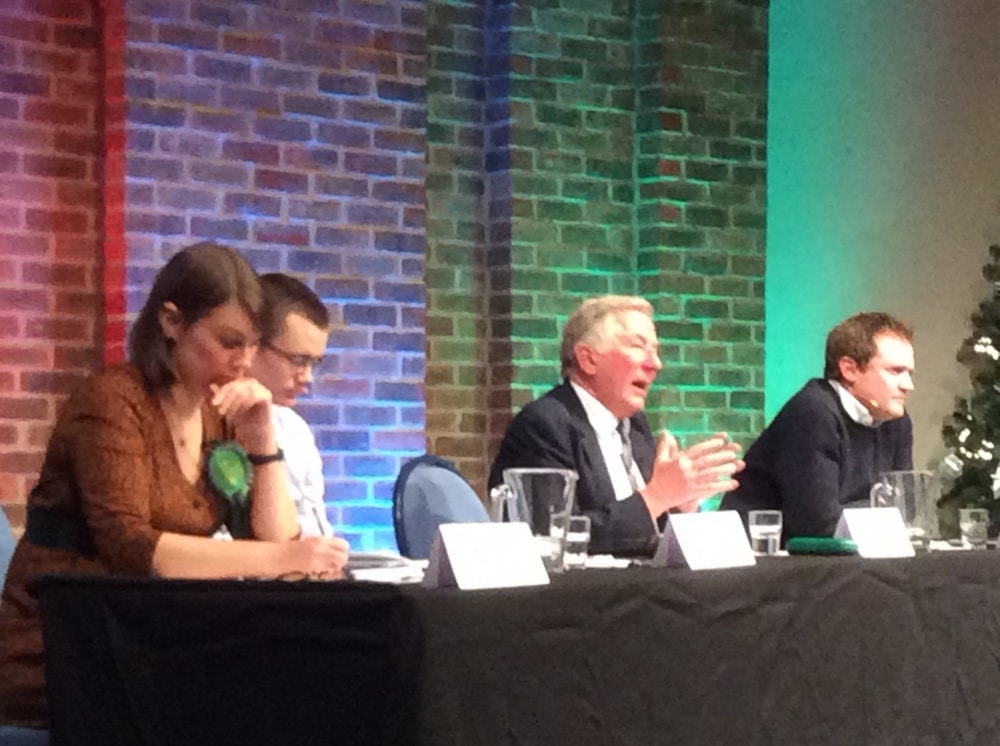The four hopefuls converged on Tonbridge Baptist Church to face the voters at the Hustings last week, and responded to questions submitted by local residents and picked out of the hat in advance.
It was to prove a revelatory evening, with the candidates revealing details of their lives that had not been seen in the leaflets dropped through letterboxes.
The incumbent, Tom Tugendhat of the Conservative Party, was in a combative mood, which was fitting since he frequently referred to his experiences in the Army – he was an intelligence officer who served in Afghanistan and Iraq.
When asked what would be done to help children who have mental health issues, he admitted that after serving in Afghanistan, ‘I found it hard to come home’.
There were two questions on mental health, and citing the example of Hillview School as a beacon of light, he said: “I’ve seen it done well. I’ve seen it done badly too. Parity of esteem is just as important as parity of funding.”
The Labour candidate Dylan Jones, standing for a second time in the borough, had revealed something of his role as a manager with the Royal Mail.
On the issue of mental health he said: “Kent is in a far worse condition than others. When people come to me, as a manager I find it very difficult to access services for staff who are in crisis.”
April Clark, the Green Party candidate, is also standing again and successfully gained a seat on the borough council in May’s local elections.
She followed the personal theme when she decried the rising use of foodbanks, explaining her own background.
She revealed that her parents had split up and she had ‘moved around a lot’ with her disabled mother, and said of those who depended on the charity of others: “It breaks my heart. We should be ashamed.”
The Liberal Democrat candidate Richard Morris offered a lengthy synopsis of his impressive career, which included working as a lawyer, as chief executive of a publishing house, and as a senior figure in music education.
But despite this highbrow resume he slammed the fact that in modern Britain people talk of a ‘legal right to food – this is extraordinary’.
Mr Morris stressed that the election is all about Brexit. The audience were clearly Remainers – in contrast to 55 per cent of the borough who voted to leave.
The assembly was appreciative of his frequent calls for the whole thing to be dropped – echoed by Ms Clark, while Mr Jones found Labour’s equivocation on the issue less favoured by the throng.
But despite the Greens’ opposition to leaving the EU from day one, Ms Clark said the climate emergency was the most pressing issue on the agenda, adding: “Some things are bigger than Brexit.”
It took an hour before the ‘B word’ was mentioned in a question. Mr Tugendhat admitted that although he had voted in favour of the deals struck by Theresa May and Boris Johnson, he had ‘worked on the doorstep’ campaigning for Remain.
Typical of his bullish stance on the hustings he challenged his critics: “I saw one or two of you there on those long days and cold nights – but not many.”
He has held the seat since 2015 and is very likely to win again – his predecessor John Stanley was the Tory MP for more than 30 years from 1974, when the constituency was created.
The Times apologises for printing the name of the Green Party candidate April Clark incorrectly in last week’s paper.








